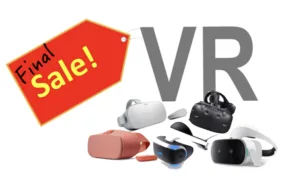After Facebook bought Oculus for a good chunk of change, the world was put on notice that this new ‘VR’ technology was going to revolutionize human society. In the following years, many hardware and software developers invested substantially into this new field that, soon after, spawned other reality technologies.

There were even VC funds that specialized in VR investments. Large and small companies went on record to develop the ultimate hardware that would allow this new technology to shine.
From the beginning it was clear that VR as a technology was a platform that disrupts the user’s interactions with the immediate environment. Other reality flavors like AR and MR are trying to overcome this by overlaying the computer-generated reality onto the real world. All technophile people (like yours truly) were drawn to this technology and surrounded any new headset and software app like a moth that is drawn to the light. Was this the Next Big Thing? (Honestly how often have you read this analogy before?)
In the beginning, VR was meant for gamers as the optimal target group. With many headsets being released it was only a question of bringing the price down low enough for the average gamer to jump on the bandwagon. This is not exactly what happened. Prices dropped, but the large adoption of the technology by gamers never materialized. As a matter of fact, some game developers have even dropped the development of VR titles from their portfolio.
Still, some market forecast analysts are still promoting very large sales numbers, but are starting to push out the years. Others are switching from the VR flavor to the AR flavor and include AR apps that are being viewed on the smartphone or tablet. Maybe this is just semantics, but in my view this is something completely different to what was discussed when AR/VR floated to the top of the list of high potential technologies.
So where is VR heading? That is a good question and one where none other than Palmer Luckey just weighed in on. On his blog, he made some interesting comments about the VR landscape and the future of it. His blog “Free isn’t cheap enough” looks at the status and future of the VR business. There are several take-aways from this blog that are quite interesting.
- Selling hardware is not where the money is. It is in the engagement of the user.
- The continued use of the VR technology after the hardware purchase is very low.
- Giving a headset away will not change the continued usage issue.
- –> The reason behind the lack of use: Quality of experience.
This is an interesting view of the VR industry from someone that, at least for some time, had a real inside view of this industry. To be honest, it resonates somewhat with me, as I would have been one of those non-users after purchase. Since I do not fall into the early adopter group, for me the lack of quality translated into a NO at the checkout counter. However what is ‘Quality of Experience’?
As a display guy, this translates for me mainly into an image issue, however there are more issues to consider. There is the issue of content and how to create content for a technology platform that is not really established yet. There are a bunch of issues with the human perception of such content leading to wide discussions about various forms of motion sickness, etc. The industry is addressing many of these concerns. However, once you burn the early adopters with a product that doesn’t perform as expected, it is much more difficult to convince them of an additional trial run the next year. Maybe we need a reset and try again in couple of years? Of course, there are the Microsoft HoloLens and the Magic Leap One are still approaching the market. So far, I wouldn’t hold my breath that they can ignite consumer use in the VR and/or the AR field.
In his article he goes into more detail on the continued use issue. There are only two groups that continue to use the VR headset for an extended period after purchase, the hardcore gamers and the technology enthusiasts. I would add that in my opinion the technology enthusiasts only stick around until something new and even more exciting comes around. This leaves the hardcore gamers as the target group.When we include the observation of game developers dropping the development of VR games from their portfolio, what is left?
One market he does not touch on in his blog is the professional market. Indeed, headset developers like Vuzix who has been working in this field long before Oculus, had already switched their business model to support industrial and business applications when Facebook bought Oculus. In addition, most news about VR is focused types professional applications like, training, visualization, industry, architectural, medical, etc. Maybe there is a reason for this development? The consumer market is just not reachable at this point.
For the display industry this creates a dilemma that may actually hinder the adoption of AR/VR going forward. What we have learned so far is that the display design and quality is a key factor for the headset and its performance. However, the displays used in VR headsets were developed for smartphones, with some ‘tweaking’ to address VR-specific issues. Since the display industry is not included in the investment frenzy of the AR/VR industry, this is not going to change. Smartphones bring in the money to develop displays that give the brands an edge in marketing their smartphones. With the smartphone market approaching saturation this may change a little, but this is still where the money is. As a consequence, display development for VR headsets is a by-product of better smartphone displays. This doesn’t sound like a fast track to a better VR headset to me.
The display issue is just one of other issues the VR developers have to address, so available investment money will be split making for longer development times. In addition, with market success missing, I wouldn’t be surprised if even larger companies like Facebook, Microsoft, Sony, etc. direct their technology development dollars into other products.
Does this mean VR is an failure? I don’t think so. VR and AR for this matter, need more time to create a product that does not disappoint the consumer and delivers of the AR/VR promise of a new society paradigm it promises. (NH)

